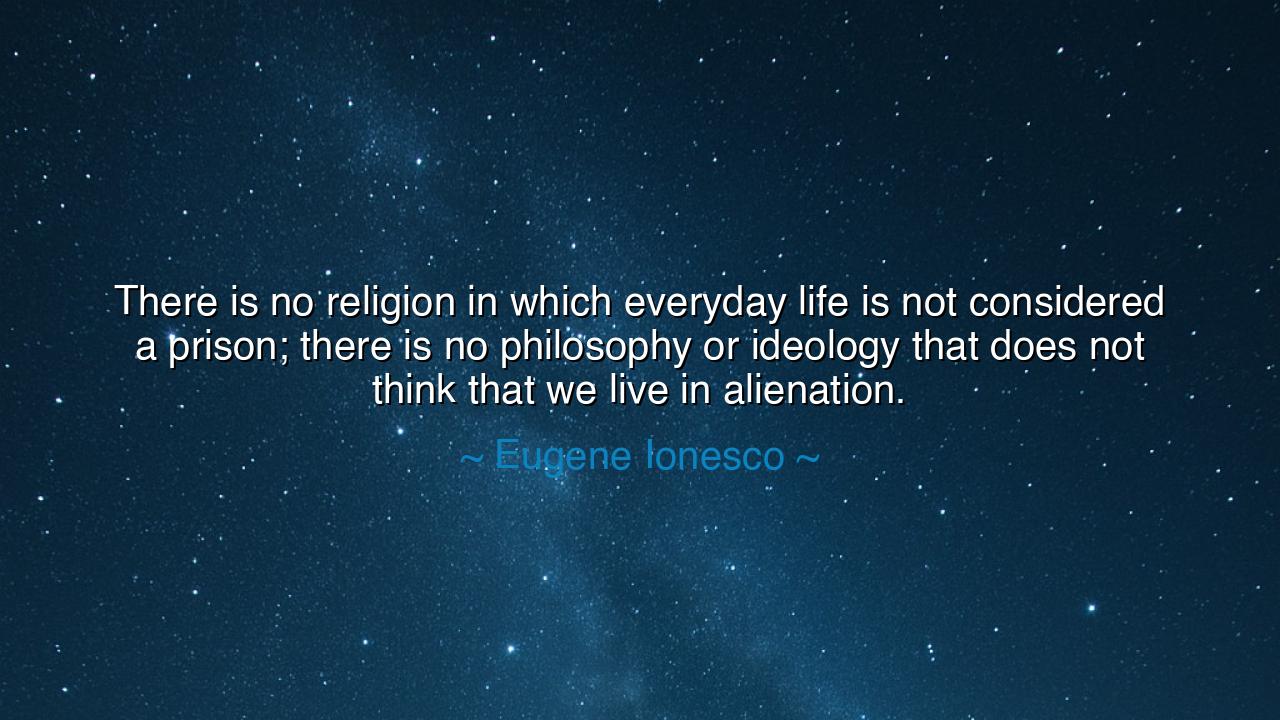
There is no religion in which everyday life is not considered a
There is no religion in which everyday life is not considered a prison; there is no philosophy or ideology that does not think that we live in alienation.






"There is no religion in which everyday life is not considered a prison; there is no philosophy or ideology that does not think that we live in alienation." These words by Eugene Ionesco strike at the heart of a deep truth about the human condition: no matter how we frame our lives—through the lens of religion, philosophy, or ideology—there is a pervasive sense that we are trapped in existence, that our everyday lives are, in some ways, a form of alienation. Ionesco's statement reflects a profound insight that both ancient and modern thinkers have grappled with—that human beings, in their pursuit of meaning and truth, often find themselves disconnected from the world around them and, more profoundly, from themselves.
In the ancient world, this sense of alienation was captured in the teachings of Socrates, who believed that most people lived in a state of ignorance—their lives bound by superficiality and distraction. In his view, people were prisoners of their own lack of self-awareness, caught in the illusions of the material world, rather than embracing the truth that could set them free. Socrates' mission was to awaken people to the realities of their existence, urging them to seek deeper understanding. His philosophy suggests that to live truly is to break free from the prison of ignorance and to confront the discomfort of self-awareness. In this sense, Socrates echoes Ionesco’s sentiment: even in the most revered pursuits—be they philosophical or religious—life is often seen as a prison, one that traps us in our limited understanding of truth.
Consider the story of Buddha, who was born into royalty and lived a life of comfort and privilege. Yet, upon encountering the realities of suffering in the world—old age, sickness, and death—he became deeply disillusioned with the material life and saw it as a form of alienation from the true nature of existence. Buddha’s teachings on detachment and enlightenment reflect the belief that attachment to the material world, and the illusion of permanence, leads to suffering and alienation. In his journey, Buddha sought a path to liberation, recognizing that we are often imprisoned by our desires, our illusions of control, and our attachment to what is fleeting. Much like Ionesco, Buddha recognized that alienation is woven into the very fabric of human life, and only through spiritual awakening can we escape this existential prison.
The existential philosophers, such as Jean-Paul Sartre and Albert Camus, further developed Ionesco’s view of alienation in the modern context. Sartre famously argued that existence precedes essence, meaning that we are thrown into life without inherent meaning and must create our own purpose through our actions. This existential freedom, however, comes at a cost—the realization that we are utterly alone in the universe, with no inherent guide or meaning. Sartre saw life as a prison in that we are condemned to freedom, forever grappling with the burden of choice and the weight of creating meaning in an absurd world. Camus, too, spoke of the myth of Sisyphus, a story of a man condemned to push a boulder up a hill only for it to roll back down. For Camus, this was the human condition: the eternal struggle to find meaning in a world that offers none.
In the modern world, we see the same theme play out in the lives of individuals who pursue success, power, or pleasure, yet find themselves plagued by a sense of emptiness and disconnection. The American Dream, for example, promises freedom, success, and prosperity, yet many find themselves trapped in cycles of consumption and competition, never truly achieving the fulfillment they seek. This is the prison Ionesco speaks of—a spiritual alienation in a world that promises happiness but often fails to deliver. Whether it’s in the pursuit of wealth, status, or pleasure, the modern world presents a set of illusions that leave us feeling more disconnected from our true selves than ever before.
The lesson from Ionesco’s words is one of awareness—that alienation is a fundamental aspect of the human experience, but it need not be permanent. We must first acknowledge the ways in which we are imprisoned by our own beliefs, desires, and attachments. To live fully, we must break free from these limitations and seek to reconnect with our authentic selves. The world, in all its complexity and illusion, may trap us, but through self-awareness, reflection, and action, we can break the chains that bind us.
In practical terms, the path forward is one of reflection and awareness—a commitment to confronting the truth of our lives, however uncomfortable it may be. We must seek to understand our own alienation, whether it’s from others, from our spiritual selves, or from the deeper meanings of life. Through practices like meditation, journaling, or philosophical inquiry, we can begin to unravel the ways in which we are imprisoned and start to create a more authentic and liberated life. In doing so, we can free ourselves from the prison of illusion and embrace a life filled with purpose and meaning, no longer bound by the superficial constraints of everyday existence.






AAdministratorAdministrator
Welcome, honored guests. Please leave a comment, we will respond soon